

Updated · Jan 10, 2024
Updated · Aug 21, 2023
Meet Marco Rodrigues, a trailblazer with a Master's in Nanotechnology and Microelectronics. A Softwa... | See full bio
Florence is a dedicated wordsmith on a mission to make technology-related topics easy-to-understand.... | See full bio
Data has become the cornerstone of numerous industries today, empowering businesses with crucial insights and competitive advantages. Location-based data is precious in understanding consumer behaviour and optimizing marketing strategies.
Geo-targeting allows organizations to obtain this valuable location-specific data, enabling them to tailor their offerings to:
It enables access to content or data from various locations, allowing for comparative analysis. For example, if you reside in Germany and wish to examine price listings for a product, you can use geo-targeting to access and compare prices in the United States.
However, geo-targeting through web scraping is not without its challenges. Websites implement geolocation restrictions as a defensive measure to prevent data extraction from specific regions or IP addresses, limiting the scope of conventional scraping methods.
To circumvent these geolocation blocks, you’ll need to use a proxy. It works by providing scrapers with alternate IP addresses from different geographic locations.
Continue reading this article to learn more about:
We'll also cover an advanced scraping solution, Bright Data's Scraping Browser, with sophisticated proxy management to enable uninterrupted and continuous scraping at scale, bypassing IP-based website blocks.
Let’s get into it.
|
Key Takeaways |
|
|
|
|
|
|
|
|
|
|
|
Geo-targeting is a game-changer for businesses aiming to connect with their audiences on a personal level. It allows companies to customize products, services, and marketing campaigns based on specific locations.
This approach leads to better decision-making and improved customer experience because it helps businesses understand the following:
Additionally, here are other advantages businesses can derive from geo-targeting:
But as mentioned earlier, websites often use geo-location blocks, making it difficult for scrapers to gather valuable data using globally distributed IPs.
|
Warning: Repeated and aggressive scraping attempts from a single IP address can lead to IP blocks and rate limiting, further hindering the scraping process. |
To overcome the challenges posed by geolocation blocks and IP restrictions, proxies present a powerful solution for achieving accurate and reliable results in geo-targeted web scraping.
|
In a nutshell . . . Geo-targeting enhances marketing strategies by customizing products, understanding regional preferences, and conducting geographical market research. Proxies overcome geolocation blocks to ensure accurate data extraction in web scraping. |
Proxies are servers that sit between the user and the target website. They act as intermediaries between the scraper and the target website, masking the scraper's true IP address and allowing them to rotate between multiple IP addresses.
This approach brings several advantages, such as:
|
Helpful Articles: To gain more knowledge about proxies, explore Techjury's article on private proxies and fresh proxies. |
However, while proxies are indispensable tools for geo-targeted web scraping, traditional approaches to implementing proxies comes with the following limitations:
|
Pro Tip Free proxies frequently do not address IP diversity, making scrapers vulnerable to IP blocks and bans when websites detect excessive scraping activities. Always check if it’s safe to use the free proxy trial. |
Where traditional approaches to proxy implementation fall short, a robust proxy infrastructure effectively addresses these limitations.
|
In a nutshell. . . Proxies act as intermediaries, masking the scraper's IP, enabling anonymity, overcoming location restrictions, and preventing IP blocks. However, manual management and reliability issues pose challenges. |
The following section examines how Bright Data’s Scraping Browser, a fully GUI headful browser with Bright Data’s premium proxy network, makes for a highly scalable, seamless, and uninterrupted scraping process.
The Scraping Browser is a ‘headful’, fully GUI Chrome instance running on Bright Data’s servers that can be remotely connected to, with headless browsers like Puppeteer and Playwright, with the help of a WebSocket connection.
It ships with sophisticated unlocker technology to bypass all anti-scraping and internet bot detection measures. Still, most importantly, for our purposes, it also comes with Bright Data’s cutting-edge proxy infrastructure out-of-the-box, boasting:
It uses four different kinds of proxy services: residential proxies, data center proxies, ISP proxies, and mobile proxies, selecting from this pool based on the automatically-detected use case.
The Scraping Browser uses a combination of this proxy infrastructure and the unlocker technology to bypass blocks and handle IP rotation, throttling, and retries automatically for you; no code is required.
This eliminates any need to rely on external infrastructure or needs advanced code or third-party libraries, making for a seamless, comprehensive, and highly scalable solution for your data collection needs.
|
In a nutshell. . . Bright Data's Scraping Browser is a GUI Chrome instance with unlocker tech and a premium proxy infrastructure, offering seamless geo-targeted web scraping. |
Let’s now actually use the Scraping Browser for geo-targeting Amazon products.
For our example, we’ll use the Scraping Browser with Python’s Playwright package to compare and contrast Lenovo’s products on Amazon’s website in different country locations.

To set up the Scraping Browser, first start by signing up (click on ‘Start free trial’) and entering your details.

Once you’re logged in, go to Proxies & Scraping Infrastructure and select the feature Scraping Browser.

This equips us with a robust browser with built-in unlocking capabilities and proxy management services, seamlessly bypassing geolocation blocks and other restrictions.

Activate the Scraping Browser, and you can access and navigate websites via headless browsers. Bright Data provides a $5 credit to try out the Scraping Browser without any additional costs.

To start using Playwright’s seamless integration with the Scraping Browser, install the Python package by running the following command:
|
pip install playwright |
In the Access Parameters under the Scraping Browser window, you’ll find the API credentials: username (Customer_ID), zone name (attached to username), and password.
These credentials can create a session in Playwright or any other supported headless browser.
With the help of Bright Data’s detailed instructions in their documentation for seamless integration with Playwright, I built the following Python script to scrape the Amazon website from three different countries: Algeria, the United States, and Colombia.
|
import asyncio |
The browser_url variable makes the remote connection between the client and Bright Data’s server by using the WebSocket protocol (wss://). The client initiates the request, and the server responds if it accepts the connection. Once connected, the client and the server can share data using an API, which, in this case, comprises the provided username and password (auth).
Another line of code that requires further explanation:
|
browser = await pw.chromium.connect_over_cdp(browser_url) |
The connect_over_cdp() Python method attaches Playwright to the remote Bright Data browser instance (more about it here) using the Chrome DevTools Protocol, which is only supported by Chromium-based browsers. Developers use the Chrome DevTools Protocol to automate tests, web scraping, and perform other browser interactions.
Adding the parameter -country-{country} just after the <username> on the auth variable is the trick for geo-targeting. It activates the proxy’s IP address for that specific region. Let’s say we use -country-us. Bright Data’s proxy servers will pick an IP address for the United States. That is why I made a dictionary at the end, with each country and country’s code, functioning as a simple IP rotator.
The script runs three times (one for each of the countries) and prints the results as shown below:
|
----- GEO-TARGETING ALGERIA ----- |
The results show the first 10 products for each country, along with their prices and rating. As expected, the output is different for each region. Some products appear in the three countries, but their order is different, and so is their price in some cases. Let’s take the following item as an example:
|
'Lenovo 2022 Newest Ideapad 3 Laptop, 15.6" HD Touchscreen, 11th Gen Intel Core i3-1115G4 Processor, 8GB DDR4 RAM, 256GB PCIe NVMe SSD, HDMI, Webcam, Wi-Fi 5, Bluetooth, Windows 11 Home, Almond' |
The price of this item is $407.00 in Algeria, but it decreases to $398.99 in the United States and Brazil.
|
Helpful Articles: Techjury features additional articles related to data scraping.. Read our guides on how to scrape Google Search data and 5 simple methods to scrape e-commerce websites. |
The importance of location-based data in various industries cannot be overstated. Geo-targeting empowers businesses to understand regional preferences, optimize marketing strategies, and enhance user experiences.
Proxies play a vital role in overcoming geolocation restrictions for effective web scraping. But while traditional free proxies are limited, Bright Data's premium proxy infrastructure offers a powerful solution, with a vast network of high-quality IP addresses from 195 countries, ensuring uninterrupted data gathering.
With the Scraping Browser, you can leverage location-based insights effectively, driving growth and improving customer experiences through Bright Data's advanced proxy infrastructure while seamlessly bypassing geolocation and other IP-based blocks. Sign up for a free trial to experience the power of Bright Data's advanced proxy infrastructure and the Scraping Browser.
IP geolocation accuracy can be affected by your provider and device location. In general, IP-based geolocation can give 50% to 80% in providing a user's region, state, or city.
Proxy servers feature to mask IP address geolocations and are often used by fraudsters to make deceptive purchases and chargebacks. People do this to prevent being detected for having a payment method address that does not match their IP address's location.
Changing your IP address is legal in the United States. It can be done to enhance online safety and protect online privacy. However, if you are from another country or traveling to one, it's important to check the legality to avoid
Your email address will not be published.
Updated · Jan 10, 2024
Updated · Jan 09, 2024
Updated · Jan 05, 2024
Updated · Jan 03, 2024




